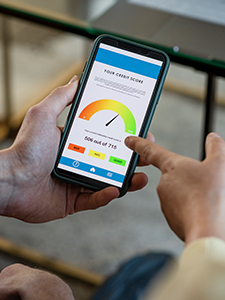POST TAGS
CreditBlog posted On August 11, 2022

Home prices, mortgage rates, and inflation are all cooling. But they’re still at higher levels than they were last year and the year before, making homeownership harder to achieve for some. Certain buyers are deciding to take a step back. Others can’t afford to wait. Regardless of where you are in the home buying process, there’s one thing that everyone can do to save money on your purchase.
Save hundreds per month on your mortgage
One of the biggest factors that determine your mortgage rate and monthly payment is your credit score. Improving your credit score, even moderately, can help you save hundreds per month. “Buyers with fair credit scores — between 620 and 639 — may be paying $288 more per month for their monthly mortgage payments compared to home buyers with excellent scores, between 760 and 850,” writes CNBC’s Lori Konish. A Zillow analysis found that home buyers with lower credit scores could pay around $104,000 more on their 30-year fixed mortgage.
How to improve your credit score to buy a house
It’s likely that you could improve your credit score and as little as 3 to 6 months. Here are some tips that can help.
Credit history and on-time payments are the two most influential factors on your score. The easiest way to assure you don’t miss payments is by setting up autopay.
The lower your credit utilization, the better. The higher the credit utilization ratio, the lower your credit score.
Leaving debts on your report shows lenders and scoring companies that you can handle and completely pay off large debts.
Closing your credit card accounts can actually lower your credit score. When you close an account, you will have a lower maximum credit limit. But you also don’t want to keep an account open with a carried balance.
Every time you apply for a new line of credit, your credit card company will pull a hard inquiry on your report – which will lower your credit score temporarily.
Viewing your own credit results in a soft inquiry – it doesn’t hurt your score. You should strive to check in on your score every few months to make sure that it is heading in the right direction.
It may seem like a lot of work now but boosting your credit score can be well worth it in the long run. If you have any credit questions, let us know.
Sources: CNBC